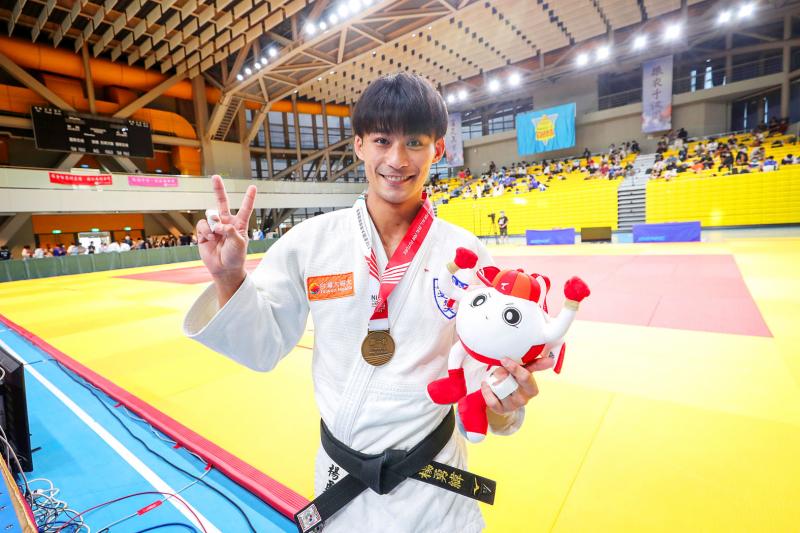Taiwanese judoka Yang Yung-wei made history in July by winning a silver medal in the men’s 60kg judo at the Tokyo Olympics. Now, the sports hero made history again, becoming the first Taiwanese judoka to take the world’s No. 1 in the men’s 60kg category, according to the latest rankings released last month by the International Judo Federation.
Yang has displaced 2021 World Judo Championships gold medalist Yago Abuladze of Russia, followed by Tokyo Olympics gold medalist Naohisa Takato of Japan at No. 3. Yang once said that becoming the world’s No. 1 and winning an Olympic gold medal are his biggest goals. When asked which one he wanted to achieve more, he answered that he was determined to accomplish both.
With his outstanding performance in sports, the 24-year-old athlete of the Aboriginal Paiwan people was named one of the “10 Outstanding Young Persons” in Taiwan this year. The 59th 10 Outstanding Young Persons Awards ceremony took place in Taitung County last month.

Photo: CNA 照片:中央社
(Eddy Chang, Taipei Times)
台灣柔道男神楊勇緯於七月創下歷史,在東京奧運柔道男子六十公斤量級勇奪銀牌。現在這位體育英雄又再創歷史,根據國際柔道總會上個月新公布的積分排名,他已榮登男子六十公斤量級世界第一,成為台灣首位登上該寶座的柔道選手。
楊勇緯榮登積分榜首,也將今年柔道世錦賽金牌得主、俄羅斯名將亞布拉基擠到第二,東奧金牌得主、日本名將高藤直壽則排名第三。楊勇緯曾公開宣誓他的兩大目標,就是登上世界第一並奪下奧運金牌。當被問到比較想達成哪個目標,他當時回答兩個都要。
由於他在運動方面優異的表現,這位二十四歲排灣族青年更榮獲
「十大傑出青年」的殊榮,第五十九屆「十大傑出青年」頒獎典禮已於上個月在台東縣舉行。
(台北時報張聖恩 )

The strongest earthquake to hit Taiwan in 25 years killed at least 16 people and damaged dozens of buildings, but the destruction was largely contained thanks to decades of preparedness work. Taiwan sits on the “Ring of Fire,” an arc of intense seismic activity along the Pacific Rim, and — much like neighboring Japan — has a long history of catastrophic quakes. How does April 3 compare with other recent quakes? The April 3 earthquake, which measured 7.4 on the moment magnitude scale, was felt across Taiwan. It was the most severe since a 7.6 magnitude quake in 1999 killed

Around the time of the Dragon Boat Festival in June, the streets of Taiwan are filled with the delightful aroma of zongzi, a traditional snack made of sticky rice wrapped in leaves. The leaves are folded into a cone and then filled with sticky rice and other ingredients such as braised pork belly, peanuts and salted duck egg yolks. The filled leaves are then tightly tied with kitchen twine and ready for cooking. 每到六月端午時節,街頭巷尾就會飄出粽子的香氣。粽子是將糯米包進粽葉的傳統美食,先將粽葉折成圓錐狀塞入糯米,以及紅燒肉、花生、鹹鴨蛋黃等配料,用棉線綁緊後即可烹煮。 Dragon Boat Festival (n. phr.) 端午節 aroma

Everyone has seen a piece of fruit turn brown after being cut. Have you ever wondered why that happens? It is a common phenomenon that occurs due to a chemical reaction called enzymatic browning. The appearance, flavor and nutritional value of the fruit are all affected by this reaction. Some fruits, such as apples, pears, bananas, avocados and peaches, are more prone to enzymatic browning than others. These fruits contain high levels of an enzyme called polyphenol oxidase, or PPO for short. __1__ This causes a chain of chemical reactions that ultimately transforms the phenolic compounds into

A: Artificial intelligence technology has been causing controversy lately: a student was caught cheating with AI to win the grand prize in an art contest. B: That’s so absurd. Does this mean that AI paints better than humans? A: Maybe. Luckily, the student was later disqualified. B: And more absurdly, it’s becoming more and more popular to use AI technology to “resurrect” people. A: Yeah, some netizens even posted videos featuring the late singer CoCo Lee, who was “resurrected” by them with AI software. A: 人工智慧的爭議不斷,有學生違規使用AI參加美術展,甚至贏得首獎。 B: 真誇張,這是不是代表AI比人類還強大? A: 或許吧,幸好得獎資格被取消。 B: 還有更誇張的︰讓死者重現的「AI復活」技術越來越熱門。 A: 對啊,還有網友製作已故歌后李玟「復活」的影片呢! (By Eddy Chang, Taipei Times/台北時報張聖恩)